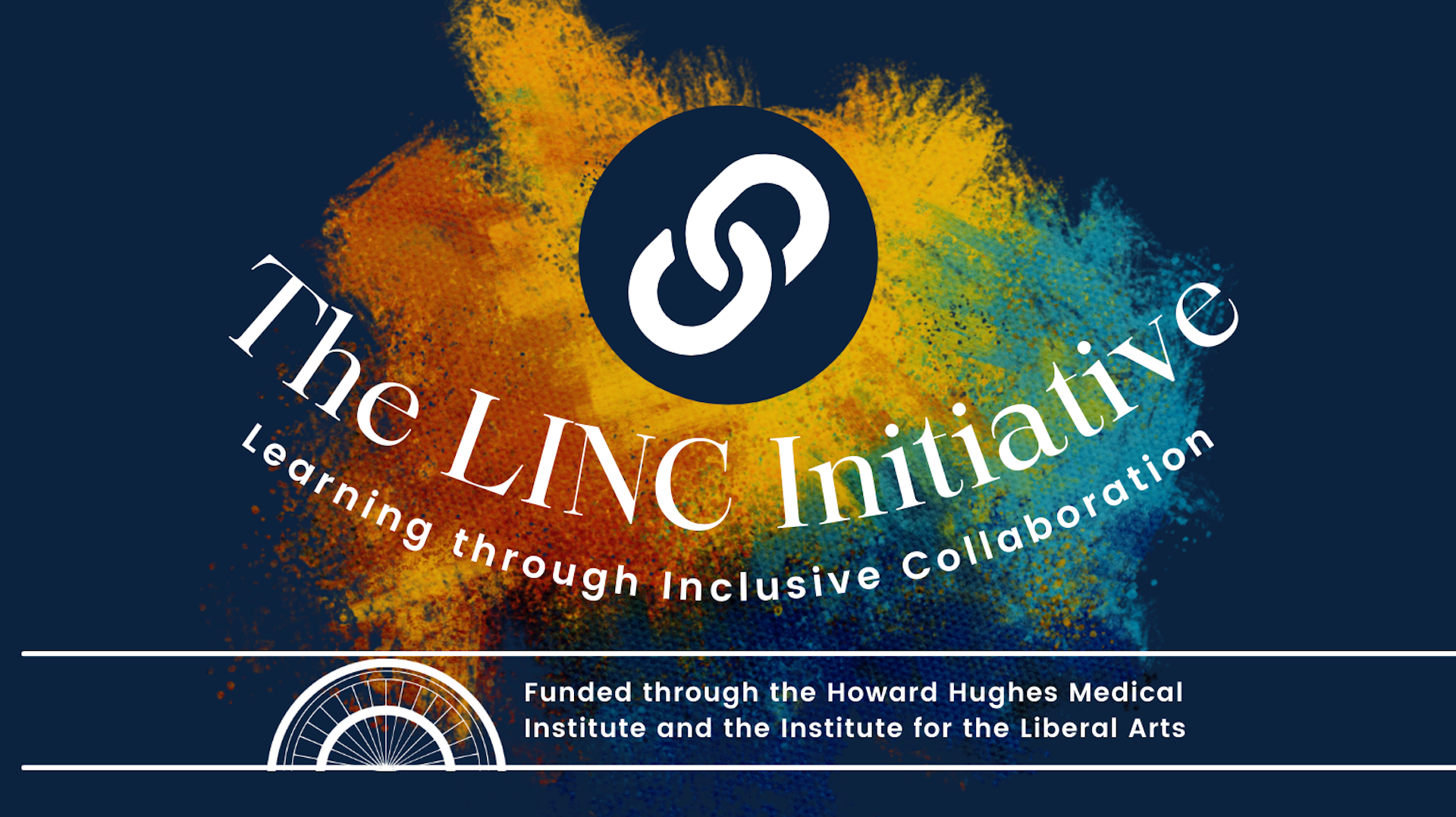
LINC Courses
LINC courses (Learning through Inclusive Collaboration) pair faculty from different disciplines, each teaching their own independent course, to create points of intersection, or links, between the two courses -- a few common readings, presentations, projects, etc., on which faculty and students in both classes will cooperate/coordinate.
The '25-26 LINC Application is Now Open
FAQS
Current LINC Courses
See the list of current LINC'd courses for Spring 2024
Previous LINC Courses
See some of our exciting LINC'd courses from previous semesters
LINC Example
Learn how two faculty have LINC-ed their courses with three points of intersection
Contact LINC
Questions? Contact LINC Director, Dr. Rose Deighton-Mohammed here
Why LINC?
The HHMI LINC initiative (Learning through Inclusive Collaboration) seeks to unlock the powerful synergy of intellectual and social inclusivity in the classroom to drive innovation at Emory University. We see interdisciplinary work as a fundamental form of intellectual inclusivity. Working across and between disciplines offers a multiplicity of points of entry, maximizing participants’ ability to find and express their perspectives and interests.
We see broad participation and engagement, by both students and faculty, as a key measure of social inclusivity. We propose that intellectual inclusivity, expressed through path breaking interdisciplinary practice, promotes social inclusivity by facilitating and attracting the participation of people from a wide range of identities, perspectives, and approaches. Through LINC courses that leverage existing courses to create points of intersection, we will assess whether intellectual inclusivity promotes social inclusivity and fosters innovation.
The LINC Workshop
As a key component of achieving this vision, we are offering a workshop on “Learning through Inclusive Collaboration” that will lead directly to faculty teaching a paired LINC (Learning through Inclusive Collaboration) course in the 2025-26 AY. The LINC Initiative Faculty Workshop will run over the course of three days: April 25th, April 29th, and August 21st, 2025.
The workshop will leverage existing course offerings by preparing faculty pairs from different disciplines to create points of intersection, or links, between the two courses that encourage a diverse range of perspectives and thus lead to a more inclusive classroom. Each course will remain independently taught through the home department, but each faculty member will revise their syllabus to be more interdisciplinary and inclusive, and to include several points of convergence with their partner LINC course, such as common readings, presentations, projects, etc., on which faculty and students in both classes will cooperate/coordinate.
Spring 2025 LINC Courses
| Indigenous Musics of the Arctic | Heidi Senungetuk | Indigenous Literature since 1850 | Mandy Suhr-Sytsma | ||
| Sociology of Creativity | Sonal Nalkur | Ballet Culture: Pleasure and Pain | Mara Mandradjieff | ||
| Topics in Language and Culture: The New Novella | Lisa Dillman | The Power of Storytelling | Kim Loudermilk | ||
| Epigenetics and Human Disease | Arri Eisen | History of Hunger | Thomas Rogers | ||
| Visual Culture | Julia Tulke | Environmental Justice | Jola Ajibade | ||
What Does it Mean to be Human? | Mark Risjord | Film Theory | Dan Reynolds | ||
| Systems Chemistry and Environmental Evolution | David Lynn | Creating New Works: Performance Synthesis in the Digital Age | Lydia Fort | Introduction to Atmospheric Chemistry | Eri Saikawa |
Some Examples of Previous LINC Courses
| PSYC 473W Neurobiology of PTSD | Andy Kazama | HLTH 334 War and Trauma | Chris Eagle |
| PHIL 190 Music and Education | Cynthia Willett | MUS/FILM 383 Music, Film & Politics | Laura Emmery |
| Dance Literacy | Lori Teague | Differential Equations | Manuela Mannetta |
| Concepts in Biology with Bio Lab 120 | Edward Nam | Spanish & Portuguese and Theater workshop in Spanish | Elva Gonzalez & Mary Lynn Owen |
| PSYC 111: Intro to Psychology | Elizabeth Kim | LAT315 Comedy (Terence) | Niall Slater |
| GER 405R Heimut & Alienation | Caroline Schaumann | CHEM/ENVS 328 Intro to Atmospheric Chemistry | Eri Saikawa |
| ITAL 375W: Social Justice in Italy and Beyond | Christine Ristaino | NBB 380: Advanced Neuroethics | Gillian Hue |
A LINC example

Professor Chris Eagle in the Center for the Study of Human Health plans to teach an upper level seminar entitled: War & Trauma. The course covers cultural and clinical ideas about war and trauma from WWI to the present, and reflects on how different forms of evidence (i.e, fiction, poetry, testimonials, theoretical essays, and clinical case-studies) can reveal different facets of the traumatic experience.
Professor Andy Kazama in the Psychology Department plans to teach an upper level seminar entitled: The Neurobiology of PTSD. The course covers various neurobiological aspects of Post-Traumatic Stress Disorder using peer-reviewed articles drawn from a wide variety of biomedical fields (i.e., genetics, hormones, brain structures, and current treatment approaches to the disorder).
Drawing from their respective backgrounds in Literature and Neuroscience, Professors Eagle and Kazama have LINC-ed their courses with three points of intersection distributed at the beginning, middle and end of the semester. They will assign the same readings and host combined class discussion sessions highlighting the importance of interdisciplinarity and the advantages of drawing on diverse ideas to spark innovation and gain a fuller understanding of traumatic experiences.